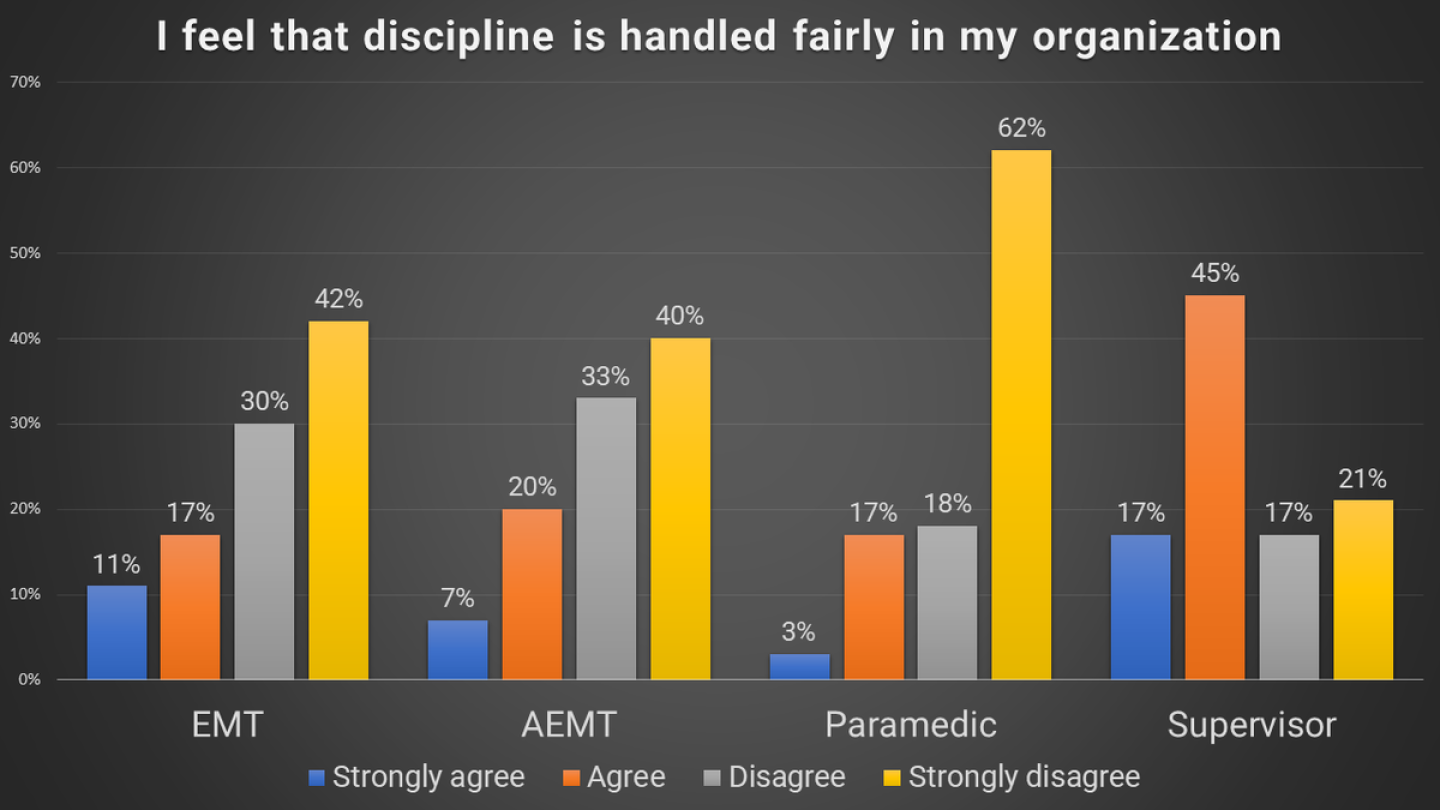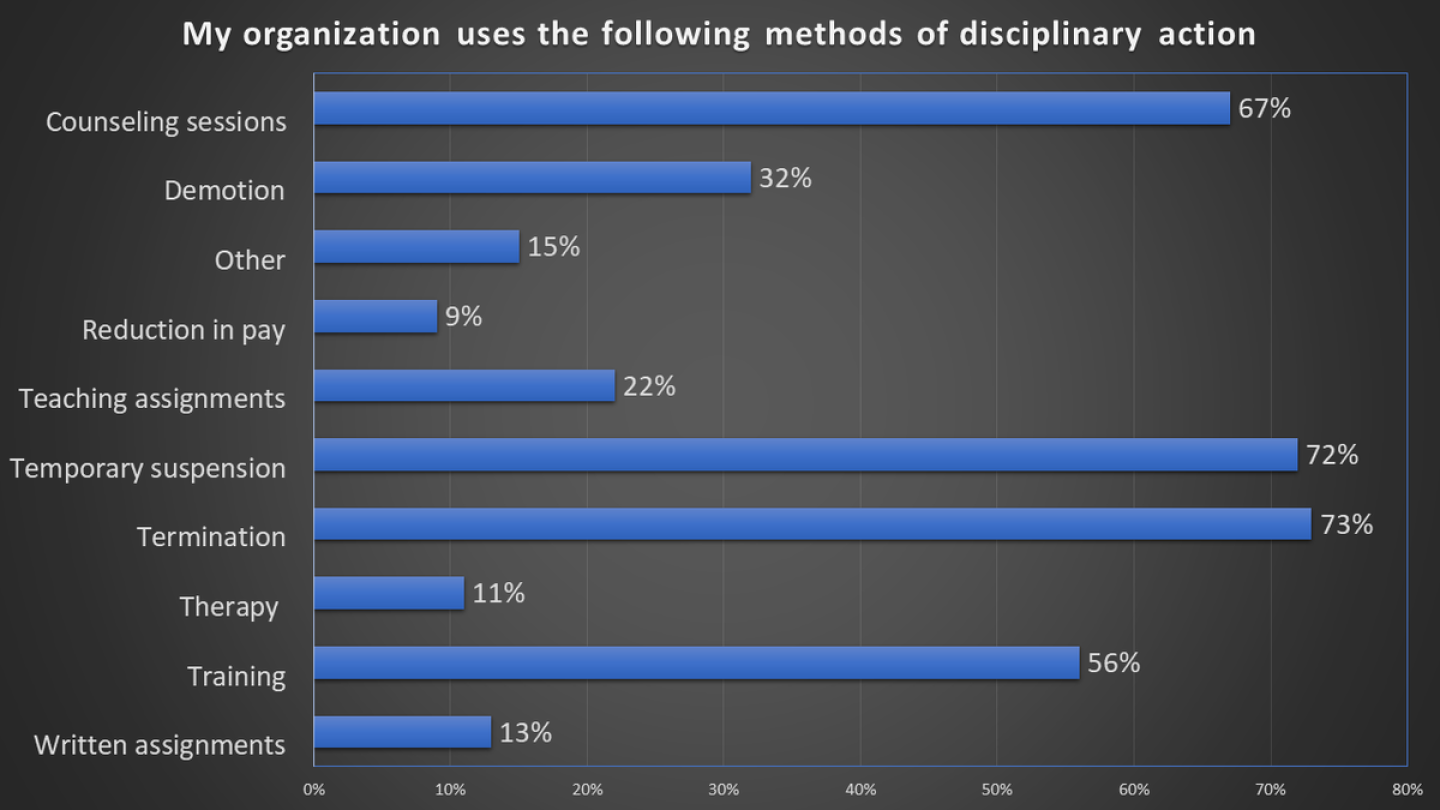By Kerri Hatt
Maintaining the integrity of an EMS agency, and trust between members, the community and community partners, is essential. A lack of accountability is one of the quickest ways to endanger patient safety, provider safety, and that trust. According to risk management guru Gordon Graham, discipline ensures that each member knows and understands their responsibilities in their role, and the consequences for not carrying out those responsibilities.
To learn more about discipline and how it is managed in EMS organizations, EMS1 conducted a survey asking EMS professionals about how EMS agencies are disciplining members who fail to follow policies and protocols, and how providers perceive their organization’s disciplinary measures.
Read the full survey results
Survey results: Improve how discipline is managed in our agencies
How disciplinary action is perceived offers evidence for implementing Just Culture values
Almost 200 EMS members answered the survey. The respondents ranged in age from younger than 20 to older than 60, with the majority being between the ages of 30 to 59. Of those who disclosed gender, 68% of the respondents were male and 26% were female. An assortment of EMTs, paramedics, supervisors, chiefs and one medical director responded to the survey. The largest group to respond was paramedics (34%). Forty-three percent of respondents were supervisors and chiefs compared to 56% clinicians.
Following are 3 takeaways from the results. View the full results here.
1. Discrepancy in providers and leaders
As we have identified in the EMS Trend Report survey, there is often a disconnect between the perception of EMS practices and trends between frontline providers and senior leadership.
The EMS1 discipline survey was no exception. When asked if respondents agree that discipline is handled fairly in their organizations, only 1% of chiefs said that discipline is not handled fairly while over 70% of EMTs and 80% of paramedics said that discipline is not handled fairly.
The difference in perception from leadership to field providers impacts trust, morale and retention efforts.
2. Favoritism, inequity is a commonly perceived issue
When asked, “What do you wish your agency’s leadership would learn about discipline?”, many of the open-ended responses referenced how discipline is not equally applied across employees. Here is a sampling of comments:
- “Fair and equal application of rules, policies and procedures for all employees not just some.”
- “That it is not different strokes for different folks.”
- “Not to single out certain people.”
- “Stop using it as a fear tool and use it fairly. They need to stop playing favorites.”
- “That it applies to all, not just the favorites.”
- “Stop favoritism.”
- “That it should be equal across the board and not based on who your friends or significant other are.”
- “Having the same disciplinary rules and disciplinary actions for everyone equally. Not be a ‘depends on who you are’ agency.”
For discipline to be effective, and reflect equity, it must be applied universally among members.
3. Providers want more training, education
Another common theme amongst open-ended responses was a request for positive, enriching discipline that can improve performance.
“Discipline points out mistakes and shows that there are consequences for them, but does little to correct the problem if one doesn’t know why the mistake was incorrect,” one respondent wrote.
Others commented they wish their leadership would approach discipline from these perspectives:
- “Education not discipline”
- “To be more proactive, not punitive”
- “Discipline is not just negative. It can be used to make someone better too.”
- “Discipline is not to destroy a person’s career but to help them improve through coaching, mentoring, and training.”
Training was reported as a common disciplinary action in just 56% of respondents’ agencies, with written assignments common in 13%. These educational actions fell far behind termination (common in 73% of agencies) and temporary suspension (common in 72% of agencies.
View the full survey results here and read more in our special coverage series, “Preserving trust: EMS performance improvement through decisive disciplinary management.”














